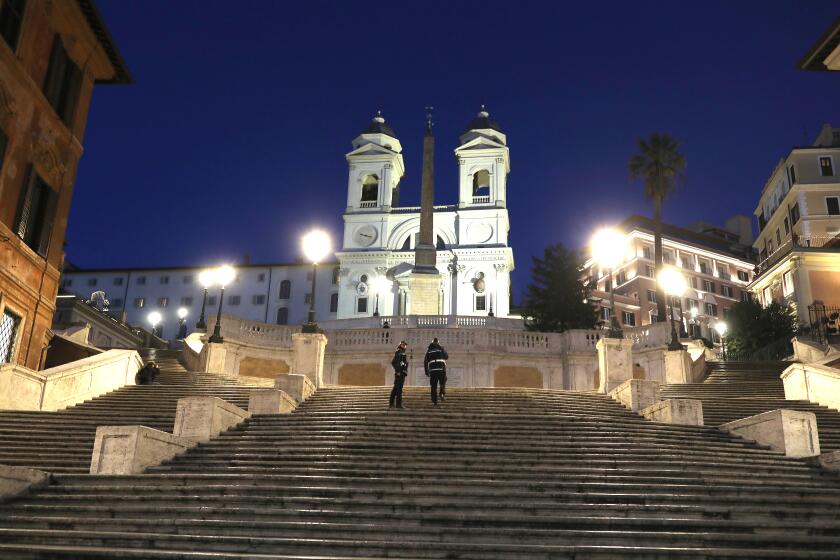Margaret Atwood on her virtual ‘Testaments’ tour wardrobe, totalitarianism and Trump
- Share via
Book Talk
Margaret Atwood and Bradley Whitford
6 p.m. Pacific Tuesday, Sept. 15
Writers Bloc Presents online stream
Access with paperback purchase of Margaret Atwood’s “The Testaments” from Chevalier’s Books
The grim dystopia “The Handmaid’s Tale” provides no hint of how delightful Margaret Atwood can be in conversation. Her humor is dry, her perspective vast, her references capacious. The 80-year old author, often a favorite among bettors for the Nobel Prize in Literature, has written fiction, poetry, nonfiction, short stories, graphic novels and books for children — 59 titles in all.
Atwood classifies much of her work as speculative fiction, this world transformed by events that stem from our present and past. That’s how the totalitarian religious state of “The Handmaid’s Tale” came about in 1985. In the MaddAddam trilogy, completed in 2013, she imagined a devastating pandemic, survived by a few humans and a number of bio-hacked animal creatures.
Adept at new technology and outspoken about the climate catastrophe, she’s also among our most recognizable authors, with her crown of curly gray hair making a cameo at the 2017 Emmy Awards alongside the cast and crew of “The Handmaid’s Tale.” That book’s sequel, “The Testaments,” took the Booker Prize last year. Marking its paperback release, she’ll be discussing it Tuesday at an event for Writers Bloc — the perfect excuse to call her office in Toronto and talk about whatever was on her mind.
At recent speaking events, you’ve been interviewed by women, and in L.A. you’re going to be talking to Bradley Whitford. How is that going to be different?
Well, I guess we’re going to find out! [Laughs] It’s going to be one of these online things, as you know, which means you don’t have to wear special shoes. What we have been told is that, although the sales of tops have continued during COVID, the sales of bottoms have not. Nobody’s showing their bottom on purpose.
Do you have a special top for your events?
I have several special tops. It just depends what I’m feeling like that day. I have green tops and I have red tops and I have pink tops.
Those are all thematic to “The Testaments.”
Green is, yeah.
And Agnes wears pink when she’s a little girl. So —
I hate to break this to you, but I’m not a little girl.
So “The Testaments” is now out in paperback.
Yeah. And they are right now starting to shoot Season 4, which got delayed because of COVID.
Of “The Handmaid’s Tale,” on Hulu.
It’s “The Handmaid’s Tale,” but of course now they have “The Testaments” too, which gives them Aunt Lydia’s back story.
“I really like the fact that it’s a weakest link episode,” Bruce Miller says.
“The Testaments” is set about 16 years earlier. Was expanding Aunt Lydia’s story inspired at all by Ann Dowd’s award-winning performance in the show?
I started writing, and I had the concept, before I could see any of it on the screen, but I saw some of the filming of it. In fact, I was in some of the filming of it. The scene in Season 1 in which Aunt Lydia is conducting the shaming session and somebody bonks Elisabeth Moss over the head. That’s actually me, as you probably know. We had to shoot it several times, because they said, come on, hit her harder. They did add a sound effect.
You couldn’t smack her hard enough.
Apparently not! I saw Ann Dowd in action on that occasion and she was really good. She was overjoyed when “The Testaments” came along. She said, “Oh, I was just praying for more Aunt Lydia, and there it was!” She has done the narration on the audio book.
“The Testaments” has three women telling their own stories, and that often humanizes a person. Aunt Lydia thinks she’s humanizing herself, but she’s also very untrustworthy. She seems to have forgotten every murder and torture session.
Well, you know. Read some memoirs of people. [Laughs] Everybody prefers to make themselves look good. Even when they haven’t been good. If you go into accounts of people who have defected from totalitarian regimes, who have been quite high up in that regime — of course they’ve been complicit. What else would they have been? If they had been openly resistant, they would have been shot. When you’re out of favor, you’re dead. I don’t know whether you saw “The Death of Stalin,” about all of the successors to Stalin, who’ve been totally complicit with what he’s been doing; it’s a power struggle for who’s going to take over. And [Lavrentiy] Beria has got the dirt on everybody, ‘cause he’s the KGB, and fully intends it shall be him. But they know that if they don’t kill him, he’s going to kill them. So that’s what they do.
That idea of secret police holding everybody’s dirty secrets — that is the source of Aunt Lydia’s power.
That is her power. But she could never be a leader because she’s female.
It made me think a little bit of the Stasi, how much they used secrets and blackmail. And I wondered if that was any throwback to Germany, where you were writing some of “The Handmaid’s Tale” in the first place.
Of course it was one of my models. We didn’t yet know exactly how many people were informing on other people, but we certainly knew. When I was living in West Berlin, I also went to East Berlin, which I could do with a Canadian passport quite easily, although Germans couldn’t. And I went to Czechoslovakia, which was still a USSR satellite. And I went to Poland. In East Germany there wasn’t really anybody I could talk to. I could talk to people in Czechoslovakia, but only out in the middle of the park. The hotel bellboy pointed at the chandelier, which meant that’s where the microphone was. We knew that if there was something wrong in our room, all we had to do was stand underneath the chandelier and say, “We really need another lightbulb.” Poland on the other hand was already pretty wide open because they had a strong opposition, the Catholic Church. They couldn’t kill everybody who was in the Catholic Church; there were too many of them. Now that country has now gone pretty right wing. Which often happens when there has been a regime calling itself Left and it’s been corrupted. But they do pretty much the same thing. [Laughs]
In 2017 you came to the L.A. Times Book Festival for a conversation and special preview of “The Handmaid’s Tale.” One of the things you said, referencing the then-recent Women’s March, was, “In a democracy, when you’re still allowed to have protest marches without getting shot and arrested —”
I know. I’ve been looking at this with great trepidation. But so far it’s only been a few people who’ve been shot and arrested, not everybody. And there has been enough pushback so that has been somewhat damped down. You’ll notice the threat to send the Army into Chicago didn’t happen.
Right. But it did happen in Portland.
It did. But that’s why it didn’t happen in Chicago. There was enough pushback against it. Would-be authoritarian leaders try it on to see if there’s any pushback. There’s still voting in the United States. Cherish it. While there’s still voting, there’s still something called public opinion. So you can try it on, but if there’s enough public opinion against it, then you’re going to think, well, maybe that’s not going to work this time. But one thing these people like to do is create chaos. And then you say, I’m going to fix the chaos. Not pointing out that, in fact, you’ve created the chaos in the first place.
That does sound familiar.
You blame the chaos on somebody else. You burn down the Reichstag and then say somebody else did it. That was a Hitler thing. You create riots in the streets and then blame them on somebody else. And then you say, well, we have to shut this down, it’s too chaotic. Let me do that for you.
You’ve also described all this, as a Canadian watching the U.S., as both riveting and appalling.
It is riveting. And it is scary because the United States is not a small unimportant country; it’s a large important country. Are we watching the diminishment of the United States on the world stage? Is China going to take over the position that the United States used to have? Let’s watch and see, but it’s not particularly good news. As for what Russia is doing, Russia is trying to weaken Western Europe to create more opportunity for itself.
And the U.S.
Well, it’s certainly trying to weaken the U.S., because who might oppose it in Europe if it got too imperialistic there? The natural person to oppose it would have been the United States. What sort of deal has been cut behind the scenes? I have a very sinister imagination.
Exactly! So as a writer of speculative fiction, you extrapolate from the news, you go back to clippings. I read Octavia Butler’s “Parable of the Sower” for the first time during the pandemic, and she worked in a similar way. I wonder, have you talked about that methodology with anybody? Did you and she ever cross paths?
No, alas, I didn’t know her. But I’m not surprised she did that because it’s the same thing that Orwell was doing in “1984.” It is the same thing that [Yevgeny] Zamyatin was doing in his seminal novel called “We,” which was a direct influence on Orwell, and that he published in 1923. He practically lays out what Stalin was going to do. It’s creepy. But he was watching, he had been an old Bolshevik. “1984” was called “1984” because it’s 1948 transposed [the year Orwell finished writing it]. All speculative fiction writers are writing about the present and the past. They’re not really writing about the future. But they’re looking at the present and they’re saying, if you keep going along this road that we’re on, here’s where you’re likely to end up. Human beings have done this in the past, which means that it’s part of the human being playbook. And therefore it could happen again, maybe with different outfits.
Albert Camus’ “The Plague,” read in quarantine for the first time, warns us to reset our own priorities
Kellogg is formerly books editor of the Los Angeles Times.
More to Read
Sign up for our Book Club newsletter
Get the latest news, events and more from the Los Angeles Times Book Club, and help us get L.A. reading and talking.
You may occasionally receive promotional content from the Los Angeles Times.









